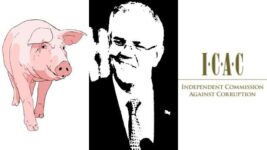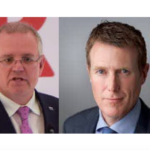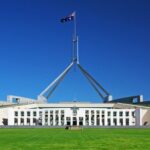The PM Champions Pork Barrelling Over Corruption Watchdog With Teeth

“It’s certainly not a model that we ever consider at a federal level,” said prime minister Scott Morrison in relation to the NSW Independent Commission Against Corruption, or ICAC, just days following the resignation of Gladys Berejiklian from the position of NSW premier.
Berejiklian resigned as the anticorruption watchdog announced it was investigating her in relation to suspect grants allocations. And while it was unclear then why she didn’t simply step aside, subsequent revelations at the ICAC hearings suggest it might have been a sound decision.
The PM made his remarks to Kochie on Sunrise, after the presenter put a question to him in line with a commonly taken mainstream media position at that time that cast the ICAC as the villain.
“Who the hell are they and who are they responsible to?” Kochie asked. “Does ICAC need to be reformed?”
Morrison then underscored that his government wouldn’t consider going down the same path as NSW and judging from the anticorruption watchdog former attorney general Christian Porter proposed late last year, there’s no fear of that happening.
But since the last federal election multiple pork barrelling scandals have rocked the Coalition – both at the federal and state levels – and rather than lamenting the departure of corrupt politicians, constituents are calling for an end to the buying of votes with money from the public purse.
Pork crackling
At a Senate committee hearing into the Urban Congestion Fund on Thursday, former NSW auditor general Tony Harris was reported as saying that the Morrison government’s handling of a commuter carparks program would “amount to corruption” if there was a federal anticorruption watchdog.
The Australian National Audit Office released a report in June that found in the lead up to the 2019 federal election, Coalition MPs had handpicked 47 commuter carparks for funding worth $660 million. And none of the projects had been recommended by the infrastructure department.
These revelations followed on from the 2020 sports rorts affair, which was exposed by another ANAO report. It found Coalition MPs – again in the lead up to the 2019 election – gifting millions to Coalition marginal seats and targeted electorates for sports projects not on the official agenda.
Senator Bridget McKenzie resigned from her ministerial role due to the fallout from the sports rorts scandal, but she’s since been appointed to a new ministerial position.
And Thursday’s Senate hearing heard that the Urban Congestion Fund, which the commuter carpark program was part of, still holds a further $890 million that the Coalition can freely allocate in a favourable manner in the lead up to next year’s federal election.
“A fringe issue”
Despite the ongoing calls for a federal anticorruption watchdog empowered to investigate grants funding allocations, like the commuter carpark program, the Commonwealth remains the only jurisdiction in the country that doesn’t have such a body.
Not long after taking the top office in August 2018, Scott Morrison dismissed a federal ICAC, as a “fringe issue”. But as his government found itself in the minority at that time, it went on to support a motion for the establishment of a corruption watchdog, rather than lose a vote in the lower house.
And in December 2018, with an election looming, Morrison and Porter announced their government would create the Commonwealth Integrity Commission, which would operate behind closed doors, wouldn’t make its findings public and would instead simply confer with prosecutors.
However, the Coalition didn’t come to the table with its draft legislation for this until November last year. And it only released its proposal after Independent MP Helen Haines forced its hand by introducing her own anticorruption watchdog bill containing a more robust model than Porter’s.
“The thing is it seems almost as if it’s set up as though it’s designed to fail,” Sydney barrister Geoffrey Watson SC told Sydney Criminal Lawyers on the release of the government draft. And he ought to know, as he’s served as counsel assisting the NSW ICAC on numerous occasions.
However, just like the initial promise to establish a federal watchdog in late 2018, it seems the Morrison government has rolled over and gone back to sleep in relation to its draft proposal.
Criminalising pork barrelling
“All governments and all oppositions make commitments to the community in order to curry favour. That’s part of the political process whether we like it or not,” Berejiklian said in January, after being caught out pork barrelling in relation to the Stronger Communities Fund. “It’s not an illegal practice.”
Since Berejiklian’s departure from the top job, NSW Greens MLC David Shoebridge has been pushing for laws that would see pork barrelling – or the distribution of public funds to buy votes – criminalised in this state.
“There is so much self-interest on the part of the government of the day in this matter, which has prevented any clear statutory rules having been put in place,” Shoebridge told SCL last month. He added that the opposition might rail against it, but once in government its reformist “zeal dries up”.
In budget estimates last week, Shoebridge persuaded new premier Dominic Perrottet to concede that “no government should invest for partisan purposes”. And the premier agreed to review how grants programs operate, and he said he’d “take advice” on whether to make pork barrelling illegal.
It’s time
Following Berejiklian’s resignation, federal opposition leader Anthony Albanese said it was time that a federal anticorruption commission with teeth is established. And the Labor Party has committed to establishing such a body if it takes out next year’s election.
Even if the Morrison government were to make federal ICAC promises at this stage, it would only see a repeat of what happened during this current term of government, with a likely issuing of a revised version of the last draft bill that proposes a body that doesn’t have any real investigative powers.
Indeed, the idea that the current Coalition government would establish an anticorruption body over a further term in office is highly unlikely, especially as its time in power has been marked by lies, stalling measures and a concerted move towards opaque governance with no accountability.







